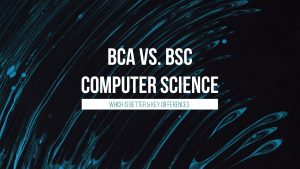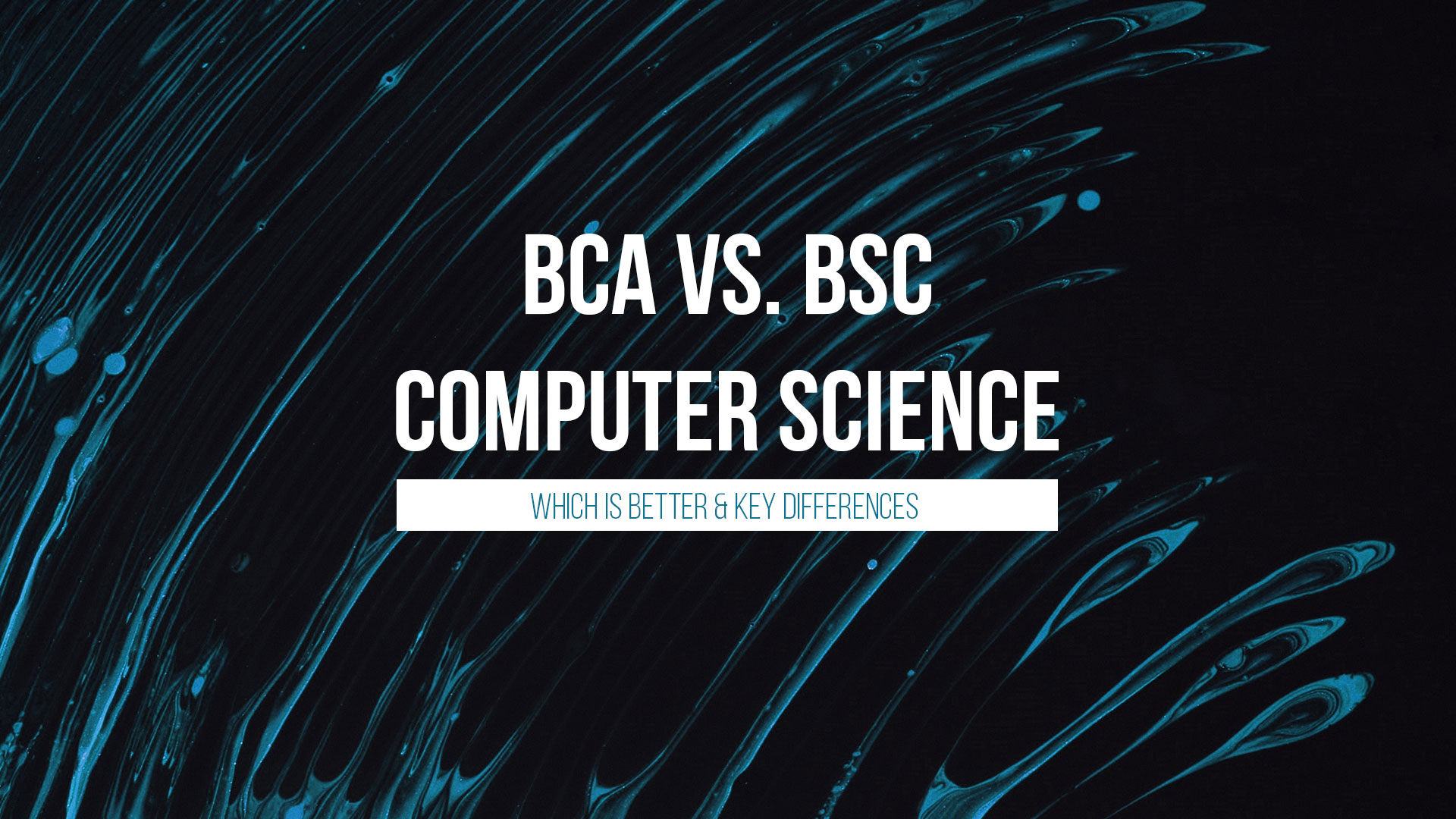Do you tend to get all technical about how computers work? Or, do you prefer to put your thinking cap on and dig deep into theory and research?
These questions matter because they can help you choose between BCA and BSc Computer Science. One focuses on practical knowledge, while the other explores the nitty-gritty behind technical concepts.
In this BCA vs. BSc computer science: which is better guide, we’ll provide detailed information about the two courses and help point you in the right direction.
BCA: Bachelor of Computer Applications
To resolve the BSc computer science vs. BCA confusion, we need to discuss both in detail. Let’s start with BCA: Bachelor of Computer Applications.
Overview of the BCA Program
Duration
BCA is typically a three-year professional undergraduate course focused on learning computer languages and applications. Since the focus is on applications, the BCA program is a software-oriented course (which is great for those who don’t enjoy learning too much theory).
Course Structure
The course structure depends on your chosen university. In most cases, you’ll have five core subjects per semester. Additionally, you’ll choose electives to learn more about specific computer-related topics.
Eligibility Criteria
Every university is free to set its own criteria for enrolling in a BCA program. Still, there are some tendencies you should know about. Students who studied arts, commerce, or science are most welcome to apply. Some universities may also have specific entrance exams that test subject-related knowledge.
Key Subjects Covered in BCA
As mentioned, the course structure in BCA programs varies (depending on the university). Regardless, every student needs to cover core subjects that will equip them to conquer the industry.
Programming Languages
Programming languages are like human languages. But rather than allowing communication among people, these languages let us “talk to” computers. This subject covers the basics of Java, HTML, C, C++, and others.
Database Management
Think of database management systems as computerized data-keeping solutions. Learning how to work with these systems is essential to ensure proper information storage and retrieval, and this is exactly what students learn on this course.
Web Development
Want to know how to create and maintain websites? This subject offers insight into behind-the-scenes work that goes into developing online stores, social networks, blogs, business websites, and others.
Networking
This subject explores the secret language in which computers, systems, and devices communicate with one another. All of which sheds light on how to connect them to share data.
Career Prospects After BCA
A degree in computer application opens doors to various career paths. Here are the job positions you can apply for after completing your studies:
- Game Designer
- System Specialist
- Technical Support
- Web Designer
- Network Administrator
- System Manager
- Software Tester
- Programmer
In terms of continuing your education, these options are available:
- Master in Computer Application
- Master of Science in Information Technology
- Master in Business Administration
BSc Computer Science: Bachelor of Science in Computer Science
If you want to know which is better: BCA or BSc Computer Science, you need to learn more about them. Since we’ve covered the BCA program, it’s time to discuss BSc Computer Science.
Overview of the BSc Computer Science Program
Duration
Students can choose between two options: regular and fast-track. The former lasts three years, while the latter lasts two.
Course Structure
One of the first things students are interested in is the course structure. In most cases, you’ll have six terms – five terms of courses and one for the final project (dissertation).
That being said, remember that every university sets its own course structure.
Eligibility Criteria
Universities set their eligibility criteria. Therefore, each institution has unique standards students have to meet to enroll. Some universities have strict requirements, the most common being a background in physics, chemistry, or mathematics.
If you don’t meet these criteria, no worries. Online degree programs like the Open Institute of Technology (Opit) have easy-to-meet entry requirements, such as English proficiency (at least a B2 level) and high school education.
Key Subjects Covered in BSc Computer Science
The BSc Computer Science program features several core subjects.
Programming Languages
During this course, students learn how to “speak” programming languages. They’re introduced to fundamental concepts and common logical and/or syntactical problems they need to resolve.
Data Structures and Algorithms
If you want to learn how to organize data or solve a particular problem, you’ll find the answers to these questions and more in this course.
Operating Systems
Every OS is an entity of its own with unique anatomies, functions, and layers.
Computer Networks
A computer network is a cluster of interconnected dots that communicate with each other and transfer data. During this course, you’ll learn how this communication works.
Career Prospects After BSc Computer Science
What can you do after BSc Computer Science? The program allows you to explore a wide array of job positions:
- Software Developer/Engineer
- Web Developer
- Data Scientist
- Cyber Security Analyst
- Database Architect
- IT Business Analyst
- App/Game Developer
- Database Architect
BSc Computer Science offers an excellent theoretical foundation. It’s no surprise, therefore, that many students decide to pursue higher education. Here are some of the available options:
- Master of Science in Computer Science
- Master in Computer Management
- Bachelor of Technology in Computer Science
Check out OPIT degrees
-
Career aligned
-
Fully Online
-
EU-accredited institution
Key Differences Between BCA and BCs Computer Science
Want to know which is better: BSc Computer Science or BCA? To get the answer, you need to learn about the differences between the two degrees.
Course Focus
You wouldn’t be wrong if you said the two programs are similar. But there’s a significant difference between BCA and BSc Computer Science: course focus. BCA is all about application it centers on current technology, computing, and programming trends. The program is ideal for students who are more interested in practical knowledge.
On the other hand, BSc Computer Science is perfect for those who like reading theory, doing research, and learning about different computer-related concepts.
Curriculum
The battle between theoretical and practical knowledge is (of course) reflected in the curriculum. The subjects BCA features develop practical, application-oriented skills, while BSc Computer Science prefers theory.
Eligibility Criteria
While trying not to sound like a broken record, let’s repeat it once again: it depends on the university. As a rule of thumb, BSc Computer Science has stricter criteria.
Career Opportunities
As far as career opportunities are concerned, both programs will set you up for success in the industry. Of course, each program opens doors to different fields. Students who complete the BCA program pursue jobs in IT or software development. Those who complete the BSc Computer Science program usually continue their education or work as researchers.
Which Is Better: BCA or BSc Computer Science?
Given that each program focuses on different aspects, it’s hard to say one stands out as “the best.” Every person is unique, and what suits you may not work for someone else. It all comes down to your future plans and ambitions. Going down the technical-heavy route is great for coding or anything else that calls for theoretical applications, but it won’t help much if you need experience in something practical, like game design. By the same token, you’ll need to draw from a well of technical knowledge when you’re working in data science or IT analysis. The choice comes down to balancing these three factors:
- Personal interest and aptitude – Do you prefer theory or practice?
- Career goals – What do you want to do after completing the program?
- Future education plans – Do you want to continue your education after the program?
Answer these questions to get a better idea of whether you should opt for BCA or BSc Computer Science. Remember, there’s no wrong answer. Picking a course isn’t like playing Russian roulette. It’s more like playing those little arcade machines that guarantee a prize with every turn – there’s no way to lose! Whatever you choose, you can build a fruitful career with computers. The path you decide to take solely depends on whether you prefer theory or practice.
Pros and Cons of Each Course
What are the strengths and weaknesses of each course? Find out here.
BCA
Pros:
- Offers practical knowledge
- Follow the latest industry trends
- Less strict entry requirements
- Job-oriented
Cons:
- Challenging course structure
- Technology rapidly evolves, so you need to constantly update your skills to stay current
BCs in Computer Science
Pros:
- Offers excellent theoretical knowledge
- Great for those who want to continue their education
- Ideal for researchers
- Provides a strong foundation
Cons:
- Stricter eligibility criteria
- Some consider it too theoretical
Tips for Making the Right Choice
These valuable tips can help you choose the right program:
- Consider your expectations. Think about what you want to get from this course and where you want it to take you career-wise.
- Study the curriculum. The curriculum is like a program’s CV. If you want to know whether it’s a good fit for you, you need to research it carefully.
- Talk to someone who completed the program you’re interested in. A person who completed the course can offer valuable intel and help you determine whether you’re on the right track.
- Consult an academic advisor. An advisor can analyze your preferences and put them into a concrete suggestion on which direction you should take.
- Think about what you want to do next. Do you want to continue your education or find a job in the industry? The answer can help you make the right decision.
Check out OPIT degrees
-
Career aligned
-
Fully Online
-
EU-accredited institution
Find Your Passion
The biggest difference between BSc Computer Science and BCA lies in the curriculum. With the former, the subjects focus on obtaining theoretical knowledge to set the ground for further education or research. On the other hand, BCA focuses on practical skills and exploring current trends.
Instead of wondering which is best: BCA or BSc Computer Science, think about your preferences and requirements. Explore your priorities, research both options, talk to professionals, and you’ll recognize the better fit.






